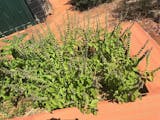The annual runner bean 'Blauhilde' is a late and special blue variety with stringless pods. 25-27 cm long, straight, thick-fleshed pods with a strong and aromatic taste. Ideal for direct sowing, pot cultivation possible, sowing spring-summer-autumn, good for mixed culture, harvesting the pods.
Description
The 'Blauhilde' runner bean is an old, annual, late and special blue variety for enthusiasts. As early as 6000 BC, beans came in a large number of different colors and patterns, which are only now being rediscovered. This extremely robust variety produces rich harvests even under adverse conditions. The plant produces 25-27 cm long, straight, thick-fleshed and blue to violet colored fruits that remain tender for a long time. When cooked, the pods turn a bright green, which is why it is also called a magic bean. The taste is strong, aromatic and develops extremely tasty stringless pods. Due to the late yield, this variety is well suited to be combined with early varieties for a long bean season. The plants also thrive in large pots.
General information
Plant family: Fabaceae
Life cycle: Annual
Days to harvest: 110 days
Plant height approx.: 300 cm
Root type: Heart rooter
Nutrient requirements: High
Water requirements: Medium
Winter hardiness: Up to 5°C
Location: Sunny until semi shady
Soil: Permeable, slightly sandy, loamy, humus
pH value: 5.5 to 6.5
Sowing and planting information
Germination type: Dark germinator
Sowing depth: 1-3 cm
Optimal germination temperature: 12-18 °C
Germination time: 10-20 days
Plant and row spacing: 15x40 cm
Germination ability of seeds: 3-4 years
Mixed culture
Optimal mixed culture: Eggplant, Cucumber, Pumpkin, Radish, Beetroot, Lettuce, Cabbage, Celery, Corn, Horseradish, Marigold
Unfavorable mixed culture: Pea
Sowing by climate zone
Subtropic climate (Mediterranean) (e. g. B. Portugal, Spain, Italy)
We recommend direct sowing from March to June and in autumn from September to October. The plants are ideally located in a sheltered location and in a sunny to partially shaded area.
Moderate climate (e. g. B. Germany, Switzerland, Poland)
Direct sowing from mid-May to July is recommended. The plants should ideally be located in a sunny spot and protected from the wind.
General recommendations
Direct sowing in rows or in clumps is recommended. When planting in clumps, five to six seeds are sown together in one planting hole, with a distance between the holes of about 40 cm and a row spacing of about 100 cm. This variety needs a framework to climb up. Beans need warmth and need at least 10°C to thrive, 18-25°C is optimal.
The 'Blauhilde' runner bean ideally prefers a soil that is constantly moist, permeable, low in nutrients and contains a little sand and lots of humus and clay. It does not tolerate waterlogging.
Additional tips
Do not sow seeds deeper than 3 cm. Pole beans are more demanding than bush beans and do not tolerate constant wetness or dryness. As the soil is supplied with nitrogen via the roots, these should be cut off after harvest and left in the soil. Due to the nitrogen excreted on the roots of the beans, planting in mixed cultures promotes surrounding plants. All "Phaseolus vulgaris" beans are poisonous when uncooked because they contain phasin. In order to quickly obtain a fine, crumbly and permeable soil with good nutrient and water retention capacity, additional incorporation of biochar and primary rock flour is recommended.
Type of propagation
Propagation occurs via seeds.
Plant care
Occasional weeding helps the young plants develop. Loose and moist soil is sufficient. No fertilization necessary.
Other names
Botanical names: Phaseolus vulgaris
English names: Common bean, Garden bean, Pole bean, Green bean, Runner bean
German names: Fisole, Gartenbohne, Stangenbohne, Strankerl
Portuguese names: Feijão verde, Feijão-corredor
Spanish names: Alubias, Fabas, Fesol, Fréjol, Fríjol, Habichuelas, Judías, Porotos
French names: Haricot à rames, Haricot d'Espagne
Origin
Country: Portugal



![Runner Bean Blauhilde [Phaseolus vulgaris]](http://www.benjis.net/cdn/shop/files/StangenbohneBlauhilde-Runnerbean-Feijaocorredor-Phaseolusvulgaris-www.benjis.net.jpg?v=1708020811&width=1445)





